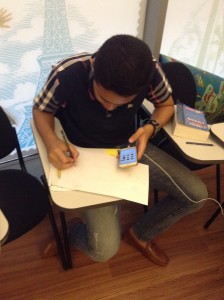 By Naomi Ganin-Epstein
By Naomi Ganin-Epstein
Teens are a tired bunch. Any high school teacher will attest to that. In fact, so will the students themselves. They certainly complain about it and exhibit their tiredness clearly, especially if they suspect you aren’t taking note of the fact.
Teens are tired in many ways.
For starters, teenagers are physically tired because many of them are in the midst of a growth spurt, their bodies are changing and their hormones are raging. Their body seems to be begging them to sleep while their mind’s response seems to be: “Are you kidding? Only little kids go to sleep early!”
Then there are the students who work after school. Juggling schoolwork and a job is a new experience for them and some don’t balance the two well. School may seem to have a lower priority for the adolescent than the job because schools don’t usually fire students for not paying attention.
Naturally, there are those who party till late or others who cannot tear themselves away from their electronic devices…
However, physical tiredness is just part of the picture. You had better wait a minute if you think handing out cups of coffee to the students will be a marvellous idea. Factor in “Tired of being at school for so many years”, “Tired of following rules”, “Tired of being told what to do by adults”, and “Tired of not being considered an adult yet” – and you won’t bother bringing in the coffee cups. Coffee won’t keep these tired teens on target.
“Hold it right there”, you may be saying after you’ve read this far, “I’ve seen teenagers spend tremendous energy on producing a school play, planning a party, or fighting to save a tree particularly favored by owls from being chopped down.” It is true. Teenagers ‘wake up’ when they care passionately about something, when they are all fired up about a project.
But then, what is a teacher to do? Even the most hard-working teacher with the best of intentions can’t make every single lesson one that each and every student will care passionately about. At least I don’t believe that can be done.
What can be done is making sure your teenage students know exactly why the tasks they are expected to do are being assigned, why they are now learning this particular topic, and exactly what the stages are that they need to work through in order to achieve any clearly defined outcome (such as passing a high-stakes test). Busy work is a bad idea in class at all ages, but it is especially disastrous with teenagers. In order to truly get ‘on board’ they have to have a clear understanding of the journey they must undertake and how it’s related to achieving the goal.
Oh, and one more thing… It helps to turn a blind eye sometimes when you see a teenager slacking off (or even nodding off!). You saw them, they know you know, but you didn’t ‘rat on them’ or make fun of them. Your status in their eyes will rise…






 By Marc Jones
By Marc Jones Lighten up! Maybe I am totally wrong here but these young people with their low-level disorder have reasons for what they do. Some of it is about what goes on in the classroom but some of it has nothing to do with school, let alone your lessons. Some teenagers get sleepy because they have heavy workload and social obligations. Question your responses and those of others around you. Are you sure the gamer who is sleepy in every class is not just trying to escape a turbulent home life? Is the noisy kid acting out or is it that there is so much worry at home that there needs to be a release somewhere? We are not always privy to such information so making assumptions seems unwise.
Lighten up! Maybe I am totally wrong here but these young people with their low-level disorder have reasons for what they do. Some of it is about what goes on in the classroom but some of it has nothing to do with school, let alone your lessons. Some teenagers get sleepy because they have heavy workload and social obligations. Question your responses and those of others around you. Are you sure the gamer who is sleepy in every class is not just trying to escape a turbulent home life? Is the noisy kid acting out or is it that there is so much worry at home that there needs to be a release somewhere? We are not always privy to such information so making assumptions seems unwise.
 by Hana Tichá
by Hana Tichá Lucy (16): It’s very hard to teach teens because they are strange people. They say and do strange things because they think they know everything about the world and life. My note: There’s no reason to despair; their view of the world might be a great topic for conversation classes.
Lucy (16): It’s very hard to teach teens because they are strange people. They say and do strange things because they think they know everything about the world and life. My note: There’s no reason to despair; their view of the world might be a great topic for conversation classes. Pavel (16): If I had to teach teenagers, I’d be angry all the time, especially if they didn’t pay attention. Note: We should remember that our students realize how hard teaching can be. This can help us build a good relationship with them.
Pavel (16): If I had to teach teenagers, I’d be angry all the time, especially if they didn’t pay attention. Note: We should remember that our students realize how hard teaching can be. This can help us build a good relationship with them.
 by Pravita Indriati
by Pravita Indriati I remember during the first year of my teaching career there was a boy who came up to me and talked animatedly about his favorite band, showed me their CD that he’d brought from home. Nowadays it’s not only music they’re up-to-date with but also technology, and social media in particular is the top trend for their age. They keep talking about their Instagram accounts, bragging about their love of Minecraft, discussing their favorite YouTubers whose updates they always follow. If we could be teachers who know about these passions, can talk about them (or even teach!), our students would then think, “My teacher is cool!”
I remember during the first year of my teaching career there was a boy who came up to me and talked animatedly about his favorite band, showed me their CD that he’d brought from home. Nowadays it’s not only music they’re up-to-date with but also technology, and social media in particular is the top trend for their age. They keep talking about their Instagram accounts, bragging about their love of Minecraft, discussing their favorite YouTubers whose updates they always follow. If we could be teachers who know about these passions, can talk about them (or even teach!), our students would then think, “My teacher is cool!” There’s just no way to get them sit, listen, and write. Much like little kids, they have lots of energy and they’ll quickly get bored once they have to waste it at their desks. There have been classes when some of my students suddenly stood up from their chairs and moved around in the middle of my lesson! I realized that combining regular tasks with some kinesthetic activities is a good idea in a classroom full of teenagers. They love running dictation, racing games, scavenger hunt, or whatever activities get them moving while learning.
There’s just no way to get them sit, listen, and write. Much like little kids, they have lots of energy and they’ll quickly get bored once they have to waste it at their desks. There have been classes when some of my students suddenly stood up from their chairs and moved around in the middle of my lesson! I realized that combining regular tasks with some kinesthetic activities is a good idea in a classroom full of teenagers. They love running dictation, racing games, scavenger hunt, or whatever activities get them moving while learning.
 A path to SUCCESS – What is it?
A path to SUCCESS – What is it? Poetry Collaboration
Poetry Collaboration Becoming More International
Becoming More International